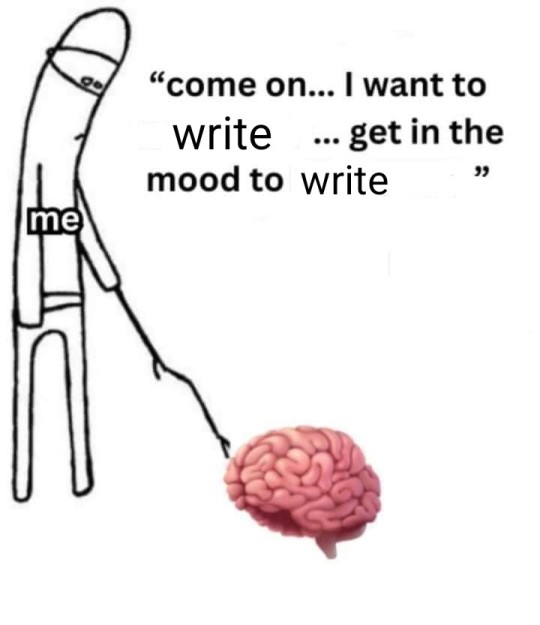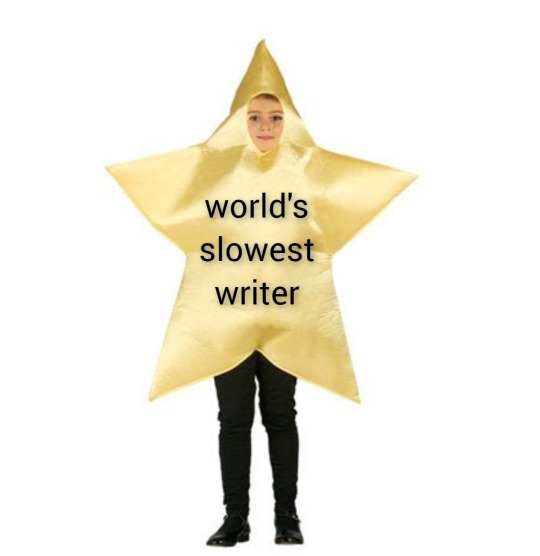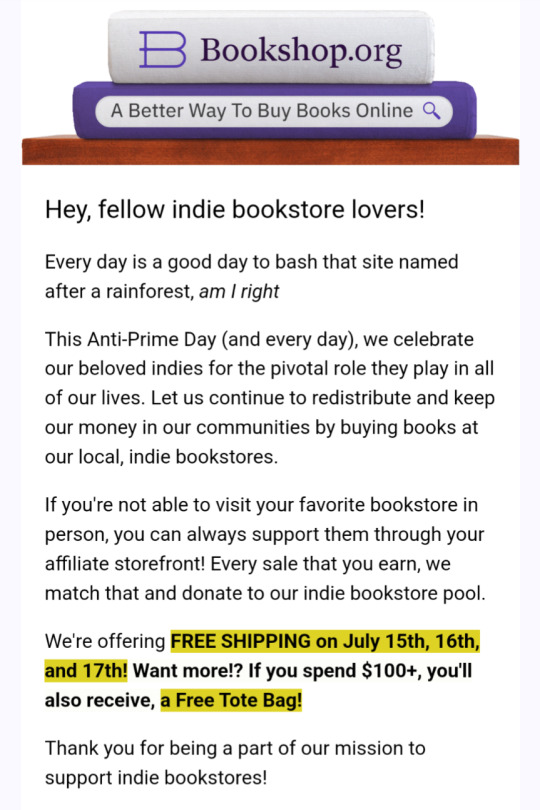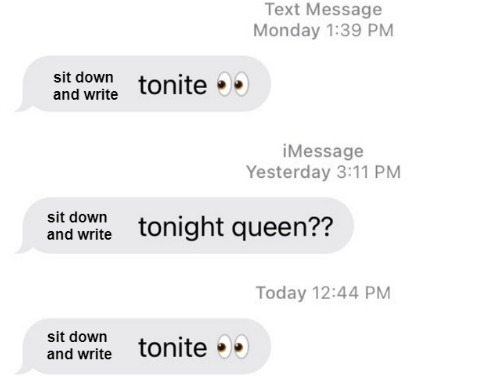#Writeblr community
Explore tagged Tumblr posts
Text

#poetry#writers on tumblr#writing#memes#writers#writing memes#writeblr community#meme#poetry memes#authors#tumblr authors#oc meme
57K notes
·
View notes
Text
This is me. Kinda jealous of all the writers who can write quickly because I can't.

#fanfic#fanfiction#amwriting#writers of tumblr#writing#writeblr#writeblr community#writing community#writerblr#writers on tumblr#writers life#writer stuff#writerslife#writer things#writerscommunity#writing problems#writerscorner#fic writing#ao3 writer
22K notes
·
View notes
Text
READERS: FYI BOOKSHOP.ORG HAS FREE SHIPPING FOR ANTI-PRIME DAYS

This is a cool platform that gives back to local and small businesses so I'm affiliated with them. If you want to use my link to buy anything I'll get a small cut which is appreciated, but regardless this is still a neat opportunity to dodge Amazon's monopoly especially if you don't have prime.
16K notes
·
View notes
Text

#women writers#writing struggles#let's stop doing this#female writers#writeblr#writeblr community#writer community#writer life#writer problems#writer things#writer stuff#writerblr#writers#tumblr writing community
11K notes
·
View notes
Text
✨ HOW TO ACTUALLY START A BOOK

(no ✨vibes✨, just structure, stakes, and first-sentence sweat)
hello writer friends 💌 so you opened a doc. you sat down. you cracked your knuckles. maybe you even made a playlist or moodboard. and then… you stared at the blinking cursor like it personally insulted your entire bloodline.
here’s your intervention. this post is for when you want to write chapter one, but all you have is aesthetic, maybe a plot bunny, maybe a world idea, maybe nothing at all. here’s how to actually start a book, from structure to sentence one.
—
🌶️ STEP 1: THE SPICE BASE ~ “WHAT’S CHANGING?”
start with this question:
what changes in the protagonist’s life in the first 5–10 pages?
doesn’t have to be earth-shattering. they could get a letter, lose a job, run late, break a rule, wake up hungover in the wrong house. what matters is disruption. the opening of your book should mark a shift. if their day starts normal, it shouldn’t end that way.
🏁 opening chapters are about motion. forward movement. tension. momentum. if nothing is changing, your story isn’t starting, you’re just doing a prequel.
—
⚙️ STEP 2: THE CRUNCHY BITS - CHOOSE AN ENTRY POINT
there are 3 classic places to start a novel. each one works if you’re intentional:
The Day Everything Changes most popular. you drop us in right before or during the inciting incident. clean, fast, efficient.
pro: immediate stakes con: harder to sneak in worldbuilding or character grounding
The Calm Before the Storm starts slightly earlier. show the character’s “normal” life, then break it. useful if the change won’t make sense without context.
pro: space to introduce your character’s routine/flaws con: risky if it drags or feels like setup
The Aftermath drop us in after the big event and fill in gaps as we go. works well for thrillers, mysteries, or emotionally heavy plots.
pro: instant drama con: requires precision to avoid confusion
📝 pick one. commit. don’t blend them or you’ll write three intros at once and cry.
—
🧠 STEP 3: CHARACTER FIRST, ALWAYS
readers don’t care about your setting, your magic system, or your cool mafia politics unless they’re anchored in someone.
in the first scene, we need to know:
what this person wants
what’s bothering them (externally or internally)
one trait they lead with (bold, anxious, calculating, naive, etc.)
that’s it. just one want, one tension, one vibe. no bios. no monologues. no “they weren’t like other girls” essays. put them in a situation and show how they act.
—
⛓️ STEP 4: OPEN WITH FRICTION
first scenes should create questions, not answer them.
there should be tension between:
what the character wants vs. what they’re getting
what’s happening vs. what they expected
what’s being said vs. what’s being felt
you don’t need a gunshot or a car crash (unless you want one). you need conflict. tension = momentum = readers keep reading.
—
✏️ STEP 5: WRITE THE FIRST SENTENCE - THEN IGNORE IT
okay. now you write it.
no pressure. you’re not tattooing it on your soul. this isn’t the final line on the final page. you just need something.
tricks that work:
start in the middle of an action
start with a contradiction
start with something unexpected, funny, or sharp
start with a small lie or a weird detail
💬 examples:
“The body was exactly where she’d left it - rude.” “He was already two hours late to his own kidnapping.” “There was blood on the welcome mat. Again.” “They said don’t open the door. She opened it anyway.”
once you’ve got it? keep going. don’t revise yet. don’t edit. just build momentum.
you can come back and make it ✨iconic✨ later.
—
📦 BONUS: WHAT NOT TO DO IN YOUR OPENING
don’t start with a dream
don’t info-dump lore in paragraph one
don’t give me three pages of your OC making toast
don’t try to sound like a Victorian cryptid unless it’s on purpose
don’t introduce 7 named characters in one scene
don’t start with a quote unless you are 800% sure it slaps
be weird. be sharp. be specific. aim for interest, not perfection.
—
🏁 TL;DR (but make it ✨useful✨)
something in your MC’s life should change immediately
pick a structural entry point and stick to it
give us a person, not a setting
friction = good
first lines are disposable, just make them interesting
and if you needed a sign to just start the damn book, this is it.
💌 love, -rin t.
P.S. I made a free mini eBook about the 5 biggest mistakes writers make in the first 10 pages 👀 you can grab it here for FREE:
#writeblr#writing advice#writing help#how to start a novel#writing tips#writers on tumblr#amwriting#creative writing#writing resources#writeblr community#on writing#writing#writers block#how to write#thewriteadviceforwriters#writers and poets#novel writing#fiction writing#romance writing#writing blog#writing characters#writing community#writing ideas#writing inspiration#writing guide#writing prompts#writing a book#writing reference#writing tips and tricks#writers
3K notes
·
View notes
Text
Here's to the people who can't get the words on the page. The people who are too tired after all life throws at them to write. The people who are blocked. The people who are burnt out. The people who can't write because of physical or mental illnesses. The people who don't know why they can't write. And the people struggling with all those other things that get in the way of writing and make it seem or be impossible.
You're still a writer, you're still an artist. And you matter. This world is better since you're in it. Thank you for wanting to write, even if you can't right now. I hope you and your words find each other soon.
16K notes
·
View notes
Text
Please stick to ONE TASK, brain!!
🧠: No. :)

#task failed successfully#goldencomet💫#meme#my memes#writing meme#writers life#writer woes#writing struggles#writers on tumblr#writing on tumblr#artists on tumblr#writeblr#writeblr community#writing community#artist community#writers on ao3#ao3 community#artists#writers#writing
9K notes
·
View notes
Text

#writeblr#writing#writers#writblr#writers of tumblr#amwriting#writeblr community#writers on tumblr#writerscommunity#creative writing#writing memes#writing problems#writing funny#wip#wips
10K notes
·
View notes
Text
Me: I love writing, it’s so fun and creatively stimulating!
Also Me while I’m writing:

#writing#writer#writeblr#writeblr community#wattpad author#ao3 author#writers on tumblr#creative writing#writing meme#writer meme#writing struggles#relatable#relatable meme#is this relatable#writing life#writer life#writers life#life of an author
2K notes
·
View notes
Text
Rescued Writing Links!
When cleaning out the HEY, Writers! Pinterest I moved some links here. The internet has changed a LOT since I started collecting these, so some links may include outdated info. All were still active when I made this, but it's been in my drafts for a hot minute.
Protip! In Firefox, check to toggle reader view when reading these (mobile: the page icon in the url bar; desktop: same icon or hit F9). This removes popups, ads, screen clutter, and often has an audio option.
Survivors of Internet Decay Award!
These active sites featured most often in my collections so they get the top of the list.
Helping Writers Become Authors
Mythcreants
Bryn Donovan
Getting Started (Ideas & Intros)
How to Start Writing a Book: Learn One Writer’s Process | Marian Schembari
How to Start a Story: 30 Opening Scene Examples | Bryn Donovan
Don’t Panic! What to Do When You Have Too Many Story Ideas | Faye Kirwin
How to Write a Killer First Chapter | Rae Elliot
How To Write A Captivating Opening Sentence
Outlining
How to Create a Flexible Outline for Your Novel | Faye Kirwin
Protagonists
How to Write Believable Characters | Bridget McNulty
4 Ways to Write a Likable Protag at the Start of the Character Arc | KM Weiland
5 Tips for Writing a Likable "Righteous" Character | KM Weiland
I Hate Your Protagonist! Want to Know Why? | KM Weiland
The Secret to Writing Dynamic Characters: It's Always Their Fault | KM Weiland
A Protagonist’s Moment of Realisation
Antagonists
Blurring the Lines: What Are Anti-Heroes and Anti-Villains?
Antagonists: Inner & Outer Demons | Kristen Lamb
How to Write Multiple Antagonists | KM Weiland
Character Building
The Epic Guide to Character Creation, Part 1 | Kylie Day
Pick Up A Bad Habit | Maggie Maxwell
How To Write Characters from the Opposite Gender | Rachel Poli
Top 4 Tips for Using Backstory in Your Novel | Diana Anderson-Tyler
Depicting Background Characters | Chris Winkle
Scene Building
The 5 Elements Of A Good Scene | Amanda Patterson
A New Way to Think About Scene Structure | KM Weiland
2 Ways to Make the Most of Your Story’s Climactic Setting | KM Weiland
8 Things Writers Forget When Writing Fight Scenes | Lisa Voisin
Descriptions
Master List of Facial Expressions | Bryn Donovan
Master List of Words to Describe Voices | Bryn Donovan
Master List of Physical Description for Writers | Bryn Donovan
Writer’s Guide to Serious Injuries and Calamities | Bryn Donovan
How to Ground Your Reader (in the setting) | Rachel Craft
The Forgotten Fifth Sense | Writer's Relief
Never Name an Emotion in Your Story | KM Weiland
Show, Don't Tell: How to Write the Stages of Grief | Ruthanne Reid
100 Words for Facial Expressions
Dialogue
How To Write Good Dialogue: Ten Tips | Irving Weinman
Seven Dialogue Don’ts | Jason Bougger
10 Keys to Writing Dialogue in Fiction | Katherine Cowley
Points-Of-View (POV)
What Every Writer Ought to Know About the Omniscient POV | KM Weiland
Motivation & Support
What New Writers Need To Know About Fear | Bryan Collins
How to Discover Your Writing Process with Gabriela Pereira | Kirsten Oliphant
Editing & Revising
18 Overused Words to Replace When Writing | Oxford Tutoring
An Easy Way to Immediately Improve Your Character’s Action Beats | KM Weiland
Want More Depth to Your Writing? | Sacha Black
How Much is Too Much Backstory? | Ellen Brock
Why Your Writing Sounds Weird (And What You Can Do About It) | Joe Brock
Self-Editing for Fiction Writers | Jenny Bravo
Favorite Revision and Editing Tricks
Short Stories & Flashfic
How to Write a Story a Week: A Day-by-Day Guide | Emily Wenstrom
How Flash Fiction / Microfiction Can Help With Your Writing | Rhianne Williams
Worksheets & Downloads
Writing Worksheet Archive
If anyone out there loves making lists and wants to transport this to another site, you have every right to do so! Just let me know in a reblog so I can share it here again :)
---
HEY! Writers' Links
Tip Jar! If you enjoy my blog and advice, support me on Ko-fi!🤗
Follow me on AO3 for fanfiction
Visit my Pinterest & Unsplash for visual inspiration
#writing#writers on tumblr#writeblr#writing resources#writing links#writing help#writing advice#writing tips#writeblr community
2K notes
·
View notes
Text
Writing smut is fine.
Reading smut is fine.
Enjoying smut is fine.
Writing or seeking out books that contain smut does not make you bad. It does not mean you are stupid or "porn brained" or whatever other bullshit people like to say nowadays.
Smut is morally neutral. Enjoying smut does not make you a bad person. It does not make what you write or what you read "worse."
Smut is mortally neutral.
#shutuplanx#writeblr#writeblr community#sex positivity#smut positivity#if i hear 'porn brained' one more time i WILL lose it#booklr
2K notes
·
View notes
Text
Fantasy Guide to Cults and Cult Leaders

Cults are a terrifying concept. The idea of a group of people under the control of a singular figure or belief that is isolated from what one knows or understands is unsettling. Cults are interesting because at their heart, they are complex dynamics which highlight some of the most unsavoury parts of human nature and the damage imposed from the imposition of certain lifestyles and beliefs upon a group of, sometimes, vulnerable people.
If it Quacks like a Cult, it probably is a Cult

A cult is a group of people who share a certain belief in how they must live their lives. Cults are usually closed communities, very often separating themselves from the mainstream society in order to protect their way of life and live in the bubble of their beliefs. Cults control, usually everything from what you might eat to who you can speak to. It ingrains in every aspect of your life, it takes over the way you live, the way you think and it draws you in like a mouth to the flame.
How a Cult Operates

A Cult doesn't have to use violence in order to control their members.
Isolation is the biggest weapon a cult has to impose their values and take control. If you prevent any outside intervention or prevention, you can impose control better. Cults typically either physically isolate their members from society, friends and family or emotionally isolate them, by telling them what they want to hear and speaking ill of the outside world. The thought of 'us vs them' is a feature that always has centre stage in a cult.
Indoctrination is used to impress certain ideas upon somebody else through repetition. Any outside thought or contradiction is explained away or discouraged. Only the ideas that the group has are right, anything else is either wrong or close to sinful. It isn't exactly that people in a cult are gullible, its that cult leaders understand their weaknesses and prey on them. They focus on things that the group mistrusts and offers protection from it.
Peer Pressure is also used. The group as a whole, armed with the beliefs of the leader, are often a weapon deployed against other members. Think about it, if you were alone in a group of people and they began to isolate you or make your life unpleasant and you had no escape, you would probably conform by the end. Human nature seeks approval, especially in a group setting.
Control over almost every aspect of life is also used. Cults usually follow strict rules. Members will have to live their lives along certain rules, how they act, what they say, who they speak to, what they believe, what they do at certain times etc. The The Peoples Temple implemented sleep deprivation on its members. The Heaven's Gate Cult had a strict vegan diet. The Aum Shinrikyo Cult bathed in the blood of their leader.
Punishment would be used to correct members who step out of line or stray from the teachings. This can be anything to social stigma and isolation to physical abuse. Sometimes even the fear of punishment is enough to keep the members in line.
Cult Leaders

Cult leaders are charismatic. They draw people in due to their knowledge and instinct of what people want and they know how to make them believe that they are the one person to deliver it. Leaders will prey on the fears of their followers, making themselves seem understanding of the member's fears and plight. They will form control around the group by presenting themselves as the answer or the salvation or the path in which the members can find it. They will manipulate relationships between members, playing them off against one another or fostering close relationships to foster competition between members. They will exploit the group for whatever they can be it money or other favours; it is not uncommon for the leaders of cults to form intimate relationships with members.
Why People Join Cults

Cults offer answers. They might be whacky answers like UFOs but it is an answer. People crave something to believe in, they want something to live for. It's a mixture of desperation, desire to be apart of something larger and a need for approval and social connection. People need something bigger than themselves and they will look for that, even in the worst of places.
Escaping a Cult and Life Beyond

People can and have escaped cults. Finding the strength to question what the cult teaches you and then the strength to abandon the life you have built in the community, takes a lot out a person. First, the person will begin to become disillusioned by the ideals and dynamics in the community, this can be due to their treatment or the fact that the cult has yet to deliver the promise they made at the beginning. They may even become liberated by an outside influence and realise the situation they are in. Leaving a cult may be dangerous so it is up to your character to plan an escape. Some cult survivors used help from outside to free themselves but an escape first comes from gradual separation from aspects of the cult. But even when somebody escapes a cult physically, the emotional and mental toll can still leave scars. They may still live in fear of the leader and the community exacting retribution, they may still internalise some of the teachings of the cult, they may have a hard time adjusting to mainstream society. They will have a long road in unlearning the harmful practises and thoughts of the cult. They will need a good support system to rebuild their lives and rebuild their relationships with friends and family.
#fantasy guide to cults and cult leaders#writing#writeblr#writing reference#writing resources#writing advice#writer#spilled words#writer's problems#writer's life#write#creative writing#reference#resource#creative inspiration#writing help#writeblr community#writers#writing community#writers on tumblr#writerscommunity#wtwcommunity
591 notes
·
View notes
Text
Prompt: 220
"You've been stabbed, you're going to medical!"
"It's fine. I've been stabbed loads of times. I know what a serious stab wound feels like, this is more of a scratch."
"..."
"Ah."
"You've been stabbed 'loads of times.' "
"That sounded more reassuring in my head."
"You're going to medical."
#writing#writing prompts#prompt#prompts#writing prompt#writeblr#creative writing#story prompts#fantasy prompts#writeblr community#writers#dc comics#dcu#marvel#hero x supervillain#heroes and villains#villain x hero#villain x civilian#reformed villain no longer reformed#reformed villain#villain#dialogue#dialogue prompt#dialogue prompts#writing dialogue#iron dad#spidersona#irondad and spiderson#batfam#batdad
2K notes
·
View notes
Text
Would anyone be interested if I put together a post on how to write a scientist/engineer/techy/smart-guy type character? What would y'all want to know?
#this post is sponsored by: my TWELFTH formlulation for the same project because the client cant make up their mind about what they want#etta rambles#writeblr#writeblr community#writing advice
2K notes
·
View notes
Text
writing tip #254: call your characters whatever you want because nobody can stop you. take my character Mike Rowhave.
microwave.
his name is microwave-- and believe it or not, this is entirely legal.
#writeblr#writers#creative writing#writeblr community#writing#jgmartin#writers of tumblr#funny memes#text post#writing advice
7K notes
·
View notes